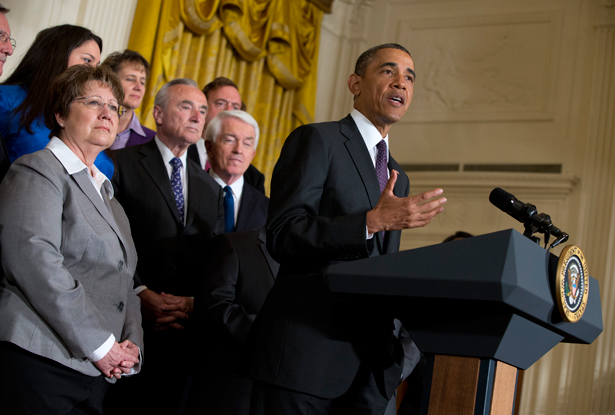
President Barack Obama gestures while speaking about immigration reform, Tuesday, June 11, 2013, in the East Room of the White House. (AP Photo/Evan Vucci)
The Congressional Budget Office released a report late Tuesday afternoon detailing the economic and budgetary impact of the comprehensive immigration reform bill as it currently stands in the Senate.
The top line of the report is that the immigration reform legislation will increase spending by $262 billion over ten years, but also increase revenue by $459 billion, for deficit reduction of $197 billion. It does so by the taxes, fines and economic growth produced by adding 10.4 million permanent US residents and 1.6 million new temporary visa holders.
There’s a lot to unpack here, but I just want to flag one thing—what the CBO says about immigration reform and the Budget Control Act of 2011, colloquially known as the debt ceiling deal.
As you may recall, in the summer of 2011 President Obama—fully enthralled with deficit reduction, and fearful of a debt ceiling default caused by congressional Republicans—agreed to a deal that set hard budget caps over the next ten years. Then, sequester cuts were set in motion over the same period because the super-committee couldn’t agree on a deficit plan. This made the budgetary straightjacket even tighter.
But, as the CBO notes, this was done in the context of a notably smaller official population than what we’d see if immigration reform passes. The projections used to set these caps (specifically, the funding levels in CBO’s 2010 baseline) didn’t take over ten million new Americans, that can join a variety of federal programs, into account: the total amount of discretionary funding is currently capped (through 2021) by the Budget Control Act of 2011; extra funding for the purposes of this legislation might lead to lower funding for other purposes.
So, the $262 billion in extra spending will have to be jammed in under the spending caps: to use the popular DC metaphor of a family’s budget, this is like setting strict spending limits for your household, and then sticking to them even though you have another kid.
The CBO report muses that this will crowd out other funding, but of course there’s another solution—just raise the caps, or scrap them entirely.
This has been almost unspeakable in the Beltway debate since the debt ceiling deal, despite the very real pressures the budget caps are already putting on the budget. But immigration reform provides two good justifications—not only the sensible need to adjust the caps due to unforeseen spending (that both parties seem to agree is necessary) but also all the extra revenue and deficit reduction it provides on the backend.
At the very least, this is an elegant solution to offsetting the sequester cuts, which both parties want to do. But even then, the budget caps are a very real problem that will need to be fixed.
Journalist Michael Hastings, 33, died in a car crash yesterday. Read Greg Mitchell's obituary here.


